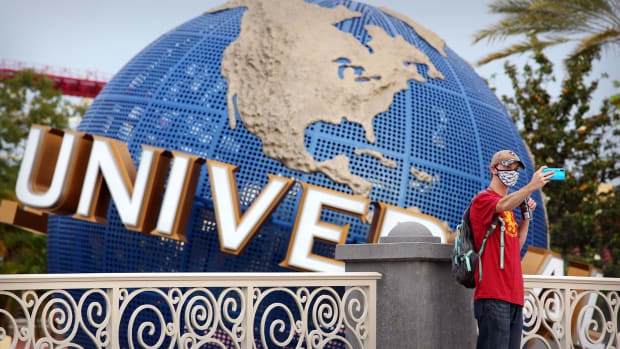A base ticket only pays for part of the experience when visiting Disney World or Universal Studios Florida. Yes, a ticket gets you in the door, and, in some cases, that could be all you need, but that's not usually true.
Few people visit Florida's biggest theme parks (or their West Coast sister properties) without paying more for everything from food to parking, faster access to certain rides, special experiences, and all sorts of other things.
Some add-ons, however, are more needed then others. You can visit a theme park without eating and, while paying extra to wait in shorter lines may make your experience better, it's most certainly not required.
Disney has not raised its core ticket price since 2019 (before the pandemic), but it has taken its formerly free FastPass+ program and turned it into the paid Lightning Lane and Genie+ programs. It has also used a mix of smaller portion sizes and more expensive food to help its bottom line on people dining in its parks.
Universal has now decided to follow a similar path. It's not raising ticket prices, but it is increasing a key fee most people cannot avoid.

GREGG NEWTON/AFP via Getty Images
Universal Studios Raises a Key Price
Unless you stay on property, get dropped off, or use a ride-share, chances are you have to park at Universal Studios Florida before entering the park. Parking is not included in the price of admission and basic parking, which can be quite a walk comes in at $27 per day.
Many people, however, opt for Prime Parking, which lets you park much closer to the parks' entrances. That can be important as Universal does not have a tram system to get from its parking garages to its theme parks.
"If you are visiting Universal Orlando and planned to use Prime Parking, you should be aware that the price has now increased $10.00 more and it is now $60.00. Early last year, Prime Parking was $40.00 and made the increase to $50.00. Universal raised the price to $60.00 for a short few weeks towards the end of the year before bringing the price back down to $50.00, until this week," Inside the Magic reported.
Raising prices on Prime Parking makes sense because it's a luxury for some and not really a choice for people who feel they actually need to park closer. It's a way for the Comcast-owned (CMCSA) theme park to bring in more revenue without angering its core audience. That's arguably a more subtle take on a price increase than what Disney has done with its FastPass+ replacements.
To be fair, Universal does offer "Express Pass," its own "cut the line" product, which uses demand-based pricing, but generally costs much more than Disney's sort-of-comparable offerings.
General parking still costs $27 per day.
Universal also recently followed Disney in raising the prices of its annual passes at its Florida parks.
"Universal raised the prices of all of its out-of-state annual passes by $50, including the 2-park Seasonal annual pass to $399; 2-park Power annual pass to $449.99; 2-park Preferred annual pass to $499; 2-park Premier annual pass to $714. Universal also raised the 3-park Seasonal to $499.99, 3-park Power to $559.99, 3-park Preferred to $606.99 and 3-park Premier to $904.99," TheStreet's Kirk O'Neil reported.
Universal Theme Parks Are Recovering
Both Universal and Disney lost billions of dollars in theme park business due to the pandemic. Comcast CEO Brian Roberts said that business has been recovering, during his remarks at his company's first-quarter earnings call.
"Finally, the business we haven't talked enough about is Theme Parks, where the recovery continues to be fantastic," he said. "I'm particularly excited about the new attractions that we opened during the pandemic, that many of our guests are now able to experience for the first time, like "Super Nintendo World" in Japan; the amazing "VelociCoaster" in Orlando; "Pets" in Hollywood; and of course, Universal Beijing."
CFO Michael Cavanagh noted that theme park revenue "increased by $941 million to $1.6 billion, and we generated EBITDA of $451 million, reflecting improved results at each of our parks compared to last year when Orlando and Japan were operating at limited capacity and Hollywood was closed due to COVID-19."







